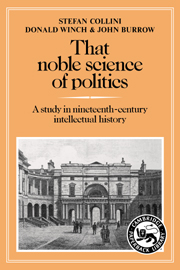Book contents
- Frontmatter
- Contents
- Preface
- PROLOGUE: The governing science: things political and the intellectual historian
- I The system of the North: Dugald Stewart and his pupils
- II Higher maxims: happiness versus wealth in Malthus and Ricardo
- III The cause of good government: Philosophic Whigs versus Philosophic Radicals
- IV The tendencies of things: John Stuart Mill and the philosophic method
- V Sense and circumstances: Bagehot and the nature of political understanding
- VI All that glitters: political science and the lessons of history
- VII The clue to the maze: the appeal of the Comparative Method
- VIII Particular polities: political economy and the historical method
- IX The ordinary experience of civilised life: Sidgwick and the method of reflective analysis
- X A separate science: polity and society in Marshall's economics
- XI A place in the syllabus: political science at Cambridge
- EPILOGUE: A nebulous province: the science of politics in the early twentieth century
- Index
I - The system of the North: Dugald Stewart and his pupils
Published online by Cambridge University Press: 17 September 2009
- Frontmatter
- Contents
- Preface
- PROLOGUE: The governing science: things political and the intellectual historian
- I The system of the North: Dugald Stewart and his pupils
- II Higher maxims: happiness versus wealth in Malthus and Ricardo
- III The cause of good government: Philosophic Whigs versus Philosophic Radicals
- IV The tendencies of things: John Stuart Mill and the philosophic method
- V Sense and circumstances: Bagehot and the nature of political understanding
- VI All that glitters: political science and the lessons of history
- VII The clue to the maze: the appeal of the Comparative Method
- VIII Particular polities: political economy and the historical method
- IX The ordinary experience of civilised life: Sidgwick and the method of reflective analysis
- X A separate science: polity and society in Marshall's economics
- XI A place in the syllabus: political science at Cambridge
- EPILOGUE: A nebulous province: the science of politics in the early twentieth century
- Index
Summary
He supplied both young and old with philosophical ideas on what they had scarcely been accustomed to think philosophical subjects, unfolded the elements and the ends of that noble science, and so recommended it by the graces of his eloquence that even his idler hearers retained a permanent taste for it.
henry cockburn, Memorials of His Time (1854)… as a preparation for the writing of various articles, the system of Edinburgh is enormously superior to that of Cambridge. The particular, compact, exclusive learning of England is inferior in this respect to the general, diversified, omnipresent information of the North; and what is more, the speculative, dubious nature of metaphysical and such like pursuits tends, in a really strong mind, to cultivate habits of independent thought and original discussion.
walter bagehot, ‘The First Edinburgh Reviewers’ (1855)dugald stewart, Professor of Moral Philosophy at the University of Edinburgh from 1785 to 1810, was the eloquent lecturer being praised by Cockburn in the passage from which the first of our epigraphs is taken, ‘that noble science’ was the science of politics as it had been cultivated during the second half of the eighteenth century by an international community of scholars within which the names of Scottish authors were prominent.
- Type
- Chapter
- Information
- That Noble Science of PoliticsA Study in Nineteenth-Century Intellectual History, pp. 23 - 62Publisher: Cambridge University PressPrint publication year: 1983
- 2
- Cited by



